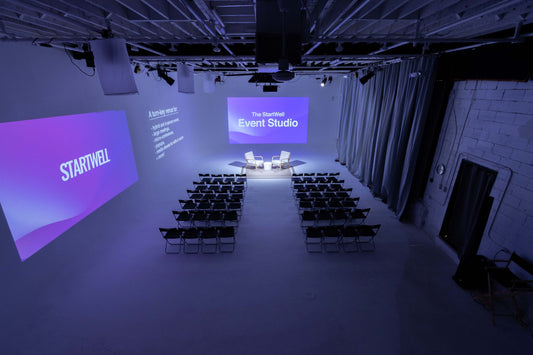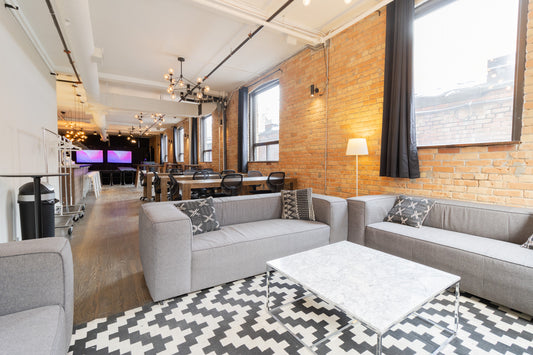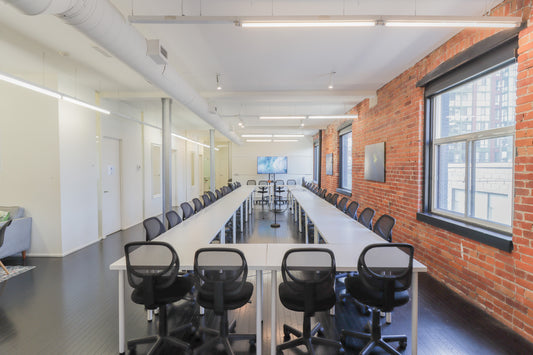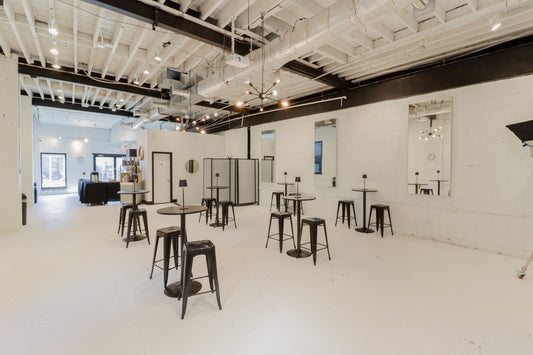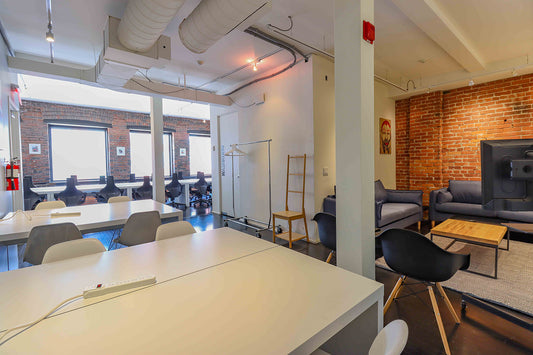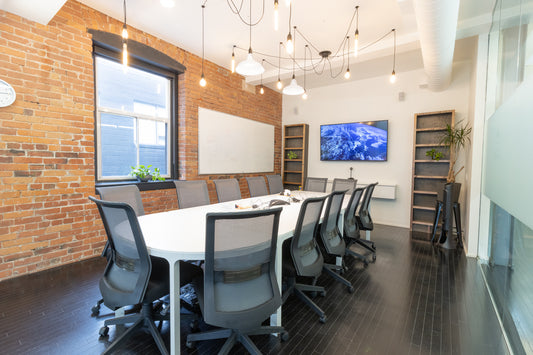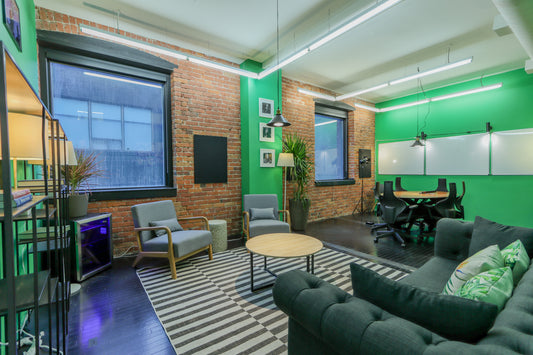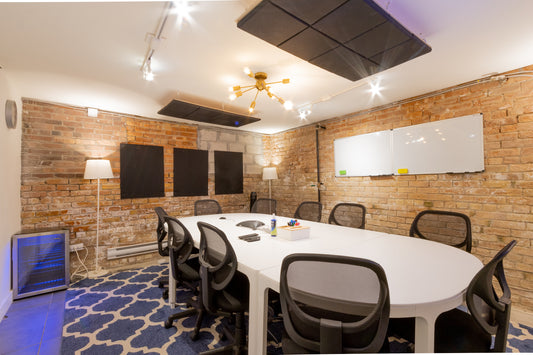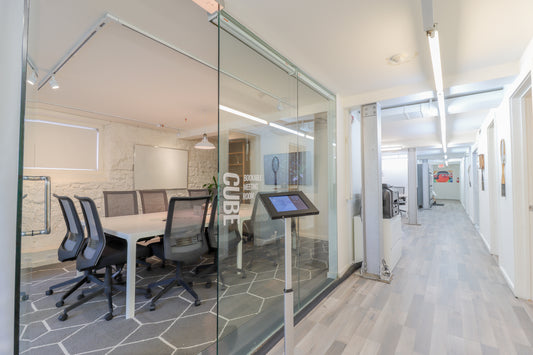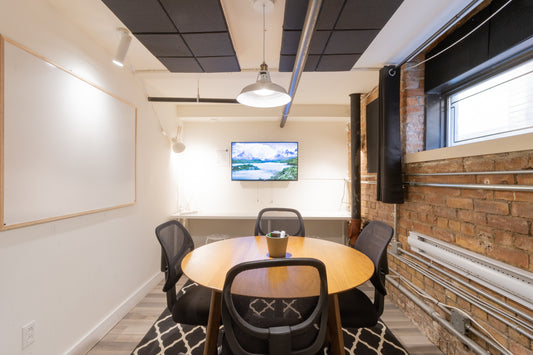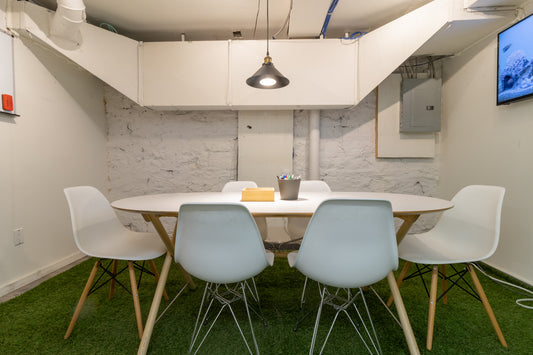Deon Blyan, the Vice President of Global Talent Development at Sunwing, joins us in studio for the first episode of 'Gathering' - a series for people who bring teams together.
About Deon:
Driven to help people thrive in dynamic organizational cultures, Deon spent 17 years in corporate retail operations in roles focused within learning, development and people initiatives. After completing his Masters of Arts in Leadership in 2015, Deon aligned his career focus by officially joining the People & Culture side of business through a relocation from Calgary Alberta to Toronto Ontario over 6 years ago.
Now within North America’s largest vertically integrated travel group, Deon oversees a unique portfolio that brings talent acquisition, learning and development, and culture engagement teams under one umbrella within the People & Culture department. With one lens and a global view to a complex and diverse multi-divisional, multi-national company, Deon is responsible for bringing aligned methods of support and a collaborative approach while maintaining divisional uniqueness where necessary while leading global company strategies for diversity, equity & inclusion and violence and harassment prevention and response.
Spend time with this conversation - here's the full transcript
Qasim Virjee 0:09
We're going to be doing this conference in April called gathering, right? Gathering is to essentially start conversations around the role and the responsibilities as it's fluid for people that support others in teams, and this podcast is leading up to that conference, but also to start sharing tips and tricks and insights from people who work in this space. Yeah, yeah. Cool. That's the goal. Yeah. That's great. So welcome. Thank you. Yeah, pleasure to have you.
Names, music, and indigenous culture
Deon Blyan 0:38
Thanks for inviting me. This is, this is great.
Qasim Virjee 0:42
So let's jump into it. A little bit of introductions. Sure. How do you see your name by the way properly?
Deon Blyan 0:48
Deon Blyan
Qasim Virjee 0:52
That's a very interesting name. When I read it is the first time I'd seen that. Yeah, you know, it's,
Deon Blyan 0:55
there's actually a long story and actually, we were you made a comment about being a musician earlier, and I don't want to do a shameful plug but actually wrote a song about my name. Not directly about my name, but it's kind of around that. So my I'm from originally from Alberta. I was born in Edmonton, me to Alberta has their acre that really, we made it to the big smoke. Isn't that crazy? So my family on my father's side is matey. Okay? And I learned through one of his cousins. This story, I'll tell you the very quick version of the story, but apparently, one of my relatives on his side, this guy was named bland Dion, BL A N dash D IO n. And I think that was his last name. And he was loosely connected to this other guy named Big Bear. Who was one of Louis riyals closest confidants and all of that time around the history. Yeah, like foundation river stuff. Yeah. And so I think the story goes that this guy was was migrating from Minnesota up into northern Saskatchewan, where my parents are from, and along the way was getting into trouble with the law. And being a First Nations indigenous person, he might have been more of a darker, darker complexion. And was bootlegging selling land that wasn't his okay. And so as he was coming further and further west, he to distance himself from his reputation, he changed his last name to blind interest, which was the more white Yeah, side of that of that name. And yeah, it's, it's crazy. My, my parents separated when I was when I was very young. And so I haven't really been in, you know, a strong connection with my father for for all that time. But I asked my mother about this, you know, this person this story, she ultimately she named me, Dion. And I said, like, Do you know anything about this folklore, and she was like, I had no idea. Nothing about that. And so this, you know, his last name was bland Dianna, my name is Dion blind. So it's really kind of out of
Qasim Virjee 3:26
the inflection. That's amazing. Really weird. But how many people can have such a colorful story? The backdrop of their name? I think it's amazing. Yeah. Fantastic. Yeah, it's crazy. Dion. So music being an interest, but how? Tell me a little bit obviously, that is a big part of culture. Right. And the expression of humanity. Yeah. You work in culture. How did you come into the space? Yeah.
Career progression in HR and leadership
Deon Blyan 3:49
Well, I would say, it kind of started for me in 919 99. I think it's been about 24 years. I consider my career I had, I had other things I did up until that point, and I was mostly I was a graduated high school 94 and really started working in a in a career focus and in 99, and I hadn't gone to I hadn't done a Bachelor's of any sort up until that time. So I actually just sort of fell into this this job with sport check. Okay, yeah. The Forzani group. Yeah, as the owner of that company, in those days, and I started as a sales associate, in a store in Edmonton. Okay, Londonderry sport check. And I was introduced to they had created as an organization, this department, they called it the training department. And it was, you know, a bunch of people that were based in the head office in Calgary that would go around and talk to store employees about customer service and product and you know, How to interact with customers and how to fit people with the right hockey skates and skis and running shoes. And I, I was, I just thought, wow, wouldn't that be fun to be a part of that department and so I kind of made it my goal from then on. And so I moved through stores, I became a department store manager and a store manager and then eventually actually joined the, the training department at head office. And, and that's kind of I think, where it all began, I started then thinking more and more about, you know, how to engage people in a common topic or a common goal. So communication became a part of my job where I, you know, I would have to, it almost started a little bit as like, How to Win over a room and get people going in the same direction. Yep. You know, and and, you know, say to somebody, well, we're going to focus on using this selling model, or this conversation model that we want, you know, you to use when you're speaking with customers on the floor. And so from there, it just kind of evolved and took on more of the management focus. And so we, we had at that organization, we were in the operations department, but there was a need for teaching individuals how to run the stores. And so it became a part of my role to help store managers understand, you know, management skills and leadership skills. And so then that's where it kind of started to snowball a bit. And then in 2013, I actually did a master's of arts and leadership, wow, organizational leadership from at a school called Royal Roads based in Victoria, British Columbia. And so everyone
Qasim Virjee 6:46
heard of this? Oh, really? Yeah, it was, I think, it sounds like a cool program.
Deon Blyan 6:50
Yeah, it was originally, like a military school, very connected to the Canadian, Navy, I think. And then in in the 40s, or 50s, or something, it became more academically focused. And, and so yeah, it was, it was a really interesting program that really puts you in learning while you're while you're working your job. So it was almost they almost set it up, as you know, you will probably get more out of the program, if you're working full time, there were students in my program that came straight from their bachelor's, and I'm sure they found it highly valuable. But, you know, I had been working in sort of a leadership, you know, capacity and, and, you know, had involvement in sort of helping shape culture in an organization for at that point, you know, 15 years or so. And so all of that experience, and, you know, sort of exposure to all those things really helped help sort of, you know, shaped my perspective on the teachings and the reading, and all the things that we're doing. And so, yeah, from there, I ended up so I was always, I spent 17 years with the Forzani group, and I was always in an operational capacity there. And then after I did the, the master's program, I actually ended up being recruited by my now boss, but she was she was working for another organization in Toronto. And, and so I, that was the first time I entered the world of human resources or people and culture, right. And that was in 2016. And so I moved, I was living in Calgary by then, and actually moved from Calgary to Toronto to work with her name's Kelly Davis. And so yeah, I've been working with her for the last seven years now at Sunwing travel group for the last three years. And so, yeah, that's a sort of the, the snapshot, I guess, of of that.
Qasim Virjee 8:46
And I'm sure our audience will appreciate as I do, hearing that arc, because I feel like, you know, people come to work in this space from so many different backgrounds. Yeah. And like AI and an interest in people and an interest in connecting people and supporting people is kind of a common thread. Yeah. So I find that very cool to, like, start from this very tactile getting people together for function. Yeah, you know, sales and leadership kind of stuff coming in then to education really probably informed, or crystallized a lot of thoughts that you haven't already, you know, brainstorming. Yeah.
Deon Blyan 9:26
Yeah. I mean, it's, it's also like, you know, when you talk about culture, you know, it's like, I also think, and I recently wrote a paper or post or whatever, that I put on LinkedIn. And, and that's something that I sort of learned while I was doing that master's program that helps me sort of, you know, frame your thoughts and my thoughts and really sort of think about how I, how I see things and I just think that it's, you know, the article is called, you know, the scope of leadership has the scope of leadership changed. And I think, you know, it was it was for so long a common conception that, you know, culture was in the hands of the human resources department, or it was something that just sort of happened and, and studies will show that culture will just happen, right? So you, you put a group of people together, call them whatever you want, give them whatever objectives you want, and leave them be come back and start to ask questions about what's important and what's not important. And that is what defines the culture. And and that will happen, you know, naturally, whether it's good or bad, you know, find their
Shaping organizational culture through leadership
Qasim Virjee 10:35
they, yeah, common ground or otherwise, what they don't have common ground on. Yeah. And they'll be able to interface
Deon Blyan 10:42
Yeah. And people will, the, the, the more dominant personalities within the group will start to, you know, set up what is accepted, what is acceptable, what people get in trouble for what people get rewarded for, and you have, then a culture and I think that's, that's in a way, how counterculture, right, you know, take shape within organizations or within communities that want to be, you know, an espoused, you know, set of values or culture. And so I think it's, it's something where, you know, I believe, you know, these days, I think every leader, every person, that is a what I like to call a talent gatekeeper, you know, that has a say, in, who joins the organization, who gets opportunities within the organization, who gets elevated within our organization, those people, those talent gatekeepers, are those those leaders, regardless of their of their function, whether they're a very tactical sales based team, or they're a IT team, or they're a airline pilot, or they are, you know, in people and culture, have a responsibility to actually shape the culture that is that is desired for that, for that company. Right?
Qasim Virjee 12:05
And the calculation of that, or the strategy around, you know, an outcome and wanting to steward culture. Yeah, it's interesting, because he right, without that kind of impetus of of, of strategy, you know, it becomes organic, and it becomes reactive, becomes this kind of, like, anti authoritarian, or whatever, like people say, this is what we need is what we want, without assuming maybe that it might be possible or even available to them. And yeah, and really the idea of kind of, yeah, stewarding culture from open dialogue, with the aim of input from all sides is something that requires effort, and yeah, thought,
Deon Blyan 12:49
Well, I think being deliberate, you know, as an organization being deliberate about what are the elements, you know, we have what we call a culture equation. And it's like, what are the things that that leaders should bring to life with their teams, that show and exhibit what the culture could and should be, culture is the is the result of people's behaviors, right. And, and there, you know, you could say, their attitudes, or you can say, the experience they have, and the way they the way they experience their, their, their work life. So the, when you look at it from that perspective, then the leaders role becomes more, it becomes this this responsibility of knowing, okay, is there a set of, you know, corporate values or organizational values? And many organizations define those specifically, and turn them into an acronym or something like that? Yeah. You know, on a poster, yeah, put it on a poster, and it becomes this marketing sort of thing. But, you know, we talk about this a lot. within our organization, we have a set of values that we call epic, and they stand for, they're an acronym for entrepreneurial, passionate, innovative, customer centric, I like that. And that actually becomes the definition of how we act, how we make decisions. But do do, does every leader within the organization know what that looks and sounds like in their area? Because that's where it becomes, it's in their hands. They're leading by example. Figure that out. Right. And yeah, and interpreting it. Yeah. And yeah, and understanding that, you know, and we're, we're an organization owned by an entrepreneur, so his version of entrepreneurial is going to be very different than the it group's version of entrepreneurial right. And that's okay. It's just for the leaders in those groups to you know, define that more clearly and make that tangible for other teams. So people can know Okay, I am I am that then contributing in a way that is showing the behaviors that are the things we find important. Sorry about that. And also, I think, you know, in our Our equation is why do we do what we do as an organization, which is our purpose? Right? And so we are, our definition of that is passionate people making vacation dreams come true. And that is really like, you know, you could argue that, you know, in an organization that sells a product or provides a service isn't isn't your purpose to, you know, increase the bottom line and make money and have profit? And those things I think, are absolutely. The
Organizational purpose and culture in the travel industry
Qasim Virjee 15:32
business fundamentals are always part of a business, but gotta have that, to encourage the quality of service. You know, you need to have people that are comfortable and happy and fulfilled. Yeah, providing that service.
Deon Blyan 15:47
Yeah. So there's a there's an author and a speaker named Dr. John is Oh, who wrote a book called The purpose revolution. He's actually based in Vancouver, but he, he's worked with organizations all over the world. And he talks about, you know, results are like oxygen for an organization. So you've got to have the profit, the results, you have to have that or you're not going to survive, right? Obviously, purpose is the like, the aspirational, why we do what we do. And so I think having those pieces of the equation gives gives the the leaders and the talent gatekeepers within the organization, the tangibles to to influence an impact and be deliberate about what the culture should be. Yeah, based on those things. So then it doesn't have that counterculture nature, or become, you know, work hard, play harder, or whatever, you know, some of these things that ended up becoming, actually quite create an imbalance in people's people's lives, you know, and so yeah, yeah.
Qasim Virjee 16:52
And of course, there's, it's interesting when we played out to a case example, let's talk about Sunwing. A little bit, because for our audience, especially the global audience outside of Canada, they might not know the brand. Yeah. So paint a picture of what Sunwing in a nutshell, is, I would say, I might be wrong on this. But I've always assumed that it's kind of like it seems to be the largest brand that I know, in this kind of packaged holiday experience. Yeah. So right from flight to hotel, to vacation. It's like everything that you guys do for people. Yeah. And you make it easy for them to quickly like get out to the beach. Yeah. Yeah. It's
Deon Blyan 17:29
really appreciate that, you know, that. So often, I think people assume it's an airline. And we we have an airline. And the airline is integral to our business, but we are a vertically vertically integrated vacation company. So the organization started as what's called a tour operator. Yeah, you know, and so if you wanted to book a vacation package, you could contact somebody at one of our travel agencies or or online. And this was founded, you mentioned an entrepreneur owns the company. Yeah. So the the founder of the organization is named Colin Hunter. And his son, Steven Hunter is the CEO and runs the organization today. And so family owned, privately held. Yeah, largest vertically integrated tour operator in in North America,
Qasim Virjee 18:20
in North America. So includes the state. Yeah. And so
Deon Blyan 18:24
the organization has now a number of sister companies that all complement the employee or the sorry, the customer journey. Sure. And so you're right, we have I believe it's nearly 50 Hotels within our Blue Diamond Resorts division, okay. That the the organization owns, but we we
Qasim Virjee 18:47
are assets that are owned or managed. There's
Sunwing's employee base and company culture
Deon Blyan 18:51
in Cuba there it's a manage a management scenario in Mexico in Jamaica, Dominican Republic. St. Lucia, Antigua, there's a there's a number of owned cool assets there. So that yeah, that division is is sort of our exclusive brands for hotels. Yeah. Cuz you can manage the experience a lot. Exactly. Yeah. And so the Royalton is the five star we have we have Planet Hollywood. Oh, yeah. As a brand. We have Mystique as a brand. But we also will, you know, we'll book you know, travelers at other hotels. So we actually have access to up to eight 800 Hotels throughout sort of the Caribbean. For travelers, so we're not we're not you know, it isn't just a small window of those 50 hotels. So, yeah, and then we actually have a destination management company called Nexus tours. Okay, that's based in Cancun so that they do like transfer. So when you And at the airport, you know, you get on the shuttle, you go to the hotel, but if you want to do an excursion or you want to, you know, do something extra within your vacations area, they help you exactly. They take you on those experiences. Then we have an organization in Atlanta, Georgia called vacation Express, which kind of does a bit of everything that we do in all the other areas. So they do tour operation booking and all that kind of stuff. But they do a lot of booking focused on our American or US travelers. And so they'll book on different airlines there. Whereas in Canada, there is the we have our Sunwing airline that services, those routes, but our travel agents in sell off vacations is what our travel agency wing is called a will, you know, we'll use Air Canada and WestJet and other other air air carriers to to get people where they need to go. So wait,
Qasim Virjee 20:57
so this is interesting, because there's a lot going on. Yeah, that's Sunway. Yeah. Assume idli. The staff base is, you know, global or at least cross North America. Yeah. How many people are employed by Sunway?
Deon Blyan 21:11
Well, when you look at Blue Diamond, the Blue Diamond Resorts side is the biggest. And then Nexus tours is up there. And then in Canada, so it's probably close to 20,000. Wow. All in. When you when you consider all those? Yeah, all the
Qasim Virjee 21:27
different functions all the different? Yeah. functions of the business. Yeah. Man, that's a big group of people. It
Deon Blyan 21:34
is yeah. And each of those divisions is is we apply the same culture equation. So our epic values and our purpose statement have been adopted by each of those divisions. And so when you when you experience our people in at the hotel at the all inclusive, they know what Epic is, and they're thinking about being epic, and they know that we're in the business to make vacation dreams come true. And so it's a it's a powerful thing, actually, when you when you consider, you know, 20,000 employees all over the western hemisphere, right? You know, from different cultures, different backgrounds, location cultures. Yep. People in Jamaica, people in Mexico, people in Toronto, people in Edmonton, people in Atlanta, you know, all all sorts of thinking and moving in the same direction. It's, it's really exciting.
Entrepreneurial culture and pandemic response in the travel industry
Qasim Virjee 22:31
Yeah, absolutely. No, I mean, I think it's thrilling the idea of especially the sector that you're in, right, so we talked a little bit, you know, off camera about this, or I mentioned this, that being in travel and leisure, and facilitating, you know, passionately facilitating these these kind of like people's escapes from the norm, right? Vacations are these wonderful opportunities for everyone to reset and have the truest experience of themselves as possible kind of thing? Yeah. How does that role play into the culture of the company? And how do you enable your staff to not just appreciate but also experience and know, kind of what the guest experiences?
Deon Blyan 23:16
Yeah, I mean, it's when I joined the organization, I was I had spent 20 years in retail operations. And so the travel industry, and certainly being, you know, a part of an organization with an airline was, was brand new to me, and something that I have experienced within this organization that has been so tangible and so powerful to me is the, the so the E and epic, the entrepreneurial being entrepreneurial. Is, is so tangible within within our organization, and our people are so they take ownership over what it is they do. And I think it is because of their understanding of what the customer is purchasing, you know, and knowing that our product is that experience, but along the way, there are all these touch points where we have an opportunity to interact with and, and strengthen you know, that that customer value proposition, right. And so people are, you know, in Sunwing travel group, people are so passionate about making that the best experience for for the traveler. And so, you know, I don't know if that answers your question, well, but it's it is something that everybody is so, like, emotionally connected to what it is that's happening and when we have, you know, flight schedule changes are there are we call them Iraq's, in the airline industry, you know, irregular operations, if there's weather if there's, you know, hurricane, you know, all of those sorts of things. People, don't the people in the organization do not hesitate to jump up to do the right thing to ensure that the customer gets where they need to go. Or it gets the experience that takes
Qasim Virjee 25:12
that proactive, you know, attitude and absolutely knowledge set to be able to kind of react without being reactive, and like not scrambling, right. Yep. So I think the end to end solution that you guys offer, you know, it sounds like it enables that entrepreneurship, because there's more tools at people's disposal on your team. Yeah, to be able to call up and make things happen out of Yeah,
Deon Blyan 25:33
especially, you know, in the airline side and the hotel side, it is, it's something where, you know, the, the, the guest experience is is so important. And yeah, it really feels like the teams on those sides are aren't able to make good decisions and to be able to, you know, take that experience into their own hands and ensure that they understand how to how to provide that. And, and I think that, you know, our epic values, and our purpose statement really helped shape that and frame that for for those those teams. So,
Qasim Virjee 26:07
so how, okay, so you've been with the organization through the last couple of years of pandemic? Yeah, yeah. Are there any anecdotes you'd like to share from that experience? And indications also of within your sector, like what you're seeing? Yeah.
Deon Blyan 26:22
It's, it's been intense. I mean, yeah, I started in August of 2019, with the organization. So I think I managed to clock six months before the pandemic really hit. And it was, it was, yeah, it was really intense. And it was something that I think really gave the organization a chance to. And they've, they've done when you look back on the history of Sunwing, travel group, there have been so many things that have been similar, but not quite as elevated as the pandemic. Yeah, you know, there's, there have been ice storms, there have been, you know, there was a whole thing around the max eight airplane that Oh, right, you own some of those. And so there was a grounding of those airplanes. And so a lot of those sorts of things really created these, and there's been hurricanes every hurricane season for the since the beginning of time. And so those sorts of things, I think, especially again, on the hotels, and the airline side, and the destination management side, the groups that are on the front line and not in the offices have, we're totally prepared for things to be kind of nutty, they're just, you know, totally accustomed, you know, to these situations where things go haywire. And they, you know, know how to persevere through that and deal with that. I think where it's been a really positive learning experiences in the areas where, you know, perhaps a, a more traditional view of being in the office was the approach for the organization. And we've learned quickly and drastically how to be hybrid. So
Remote work tools and office return after pandemic
Qasim Virjee 28:06
let's talk about that. Yeah, there are there? Are there tools you rely on now that you've had to kind of like create a stack out of or is it a digital solution thing to manage communication? And yeah,
Deon Blyan 28:16
I think, well, it was interesting that we, so we were already a Microsoft shop. So Microsoft Teams was already on everybody's computer. Right? And so it was, thankfully, it wasn't a mad dash to find a video conferencing tool or, or a chat tool or anything like that. We had that in place. It was though a fast immersion in learning how to use those Well, right. You know, and I think that there was I remember, you know, in my six months before the pandemic had having to do, because my team and my, I'm within the people and culture group that that interacts with all of those divisions I talked about earlier, sir. And so we had meetings previously, where we would have, you know, folks from from Cancun, Panama, Atlanta, you know, together on meetings where we were trying to do these video calls where we were kind of, you know, messing it up a little bit. Hearing the Echo and the feedback and stuff. Are you there? Are
Qasim Virjee 29:18
you there? Yeah, exactly.
Deon Blyan 29:19
Oh, you're on you hear me? Yeah. Yeah. And it's even to this day, the mute thing is, is a funny thing where it still gets, you know, sort of accidentally, it accidentally happens. We did
Qasim Virjee 29:30
a session in the same studio. I think it was like two weeks ago. Yeah. And it was it was a recorded call. And this is stuff we do every day. And even in the studio with professional producers. It was the same thing. And yes, it turned out to be someone's Bluetooth connection on the other side. Oh, you're kidding.
Deon Blyan 29:47
Yeah. Yeah. So I mean, we, you know, that sounds kind of that sounds small, but I think that was a big, a big thing where we immediately started sharing information around how to use Microsoft Teams better, and then people just really got used to doing that. And I, you know, on a grander scale, I think about all of that, you know where it was one day the world was told, okay, you're gonna work from home today. Yeah. And everybody was like, What? What do you mean? How do we do that? And then, you know, fast forward to a year after that, when people started talking about coming back to the office, I was like, Okay, we're gonna start coming back to the office. And the reaction was what right, you know, it was like, it was so funny, because it was like, you know, the thing that everybody thought was impossible to do. Yeah. was fully possible. Yeah. And then again, it was like, Okay, well, there's a new paradigm of what's possible, we can go back to the office a little bit. I don't know if I want to do that.
Qasim Virjee 30:44
Yeah, two years in people not necessarily wanting to come back to the office despite and that reaction being like, Oh, wait, no, now we can. Yeah, feeling that what has always been has been the standard, and now having to readdress what your sense of, of kind of workplace standards are based off of people's new experiences. Yeah.
Hybrid work arrangements and in-person collaboration
Deon Blyan 31:05
Right. Yeah. And I think it's like any new thing for for individuals that, that created habits and had, you know, and felt, you know, accustomed to a certain way of doing things. And so that was for, for us, going to the office every day. And you know, where some people would have a extremely long commute or would be riding public transit. And so now, when you when you look at the the things that are tangible, within within a company culture, in our company, culture, there, there is a desire for the employees, not necessarily the leaders, I think, and that's something I was trying to get to with that Gallup Poll thinking was that leaders who are empowered to make decisions always, this study showed that through the pandemic, they always felt psychologically safe, they always felt, you know, kind of, okay, where it was the layer below, people that were decision makers, felt a little more, you know, unstable, for certain reasons through the pandemic. And it's that group that I think we have seen through some of our employee engagement surveys, and these these sorts of data points, we have seen where it's those people that feel the, the need for, you know, the ability to work hybrid, and the ability to, you know, work from home on a day where you're doing something that doesn't involve needing to talk to anybody else. Why take a commute? Just
Qasim Virjee 32:38
to focus, just isolation. Yeah, just to like, like,
Deon Blyan 32:42
rip through an Excel spreadsheet, at your desk with headphones on. Yeah. And people walking around behind you, when, you know, that's the type of work that you may do better from your, you know, your desk in your home office at home or your kitchen table. And so I think, yeah, we learned a lot of things through that. And I think we learned I'd even heard it, you know, anecdotally mentioned, in the organization, like, we've proven that we can be productive, working hybrid, I think that the misconception at the beginning was okay, how are we going to be able to actually get anything done? How do we actually get everyone around the same table? Because no table or doing anything? And then again, I think it is what I said earlier about that entrepreneurial, and passionate mindset that everybody shows within the organization carried over into that and said, Well, you know, any, like, take any of the employees? And I think you would, you would, you would see them say, Well, I'm still I still have that focus, and I can still, I can still get this, this done, you know, from home. And so yeah, so now we're in that place where it's, we there is, I believe, and I think as an organization, we believe there is there's great value in being in the same room with people. Sure. And so now it's a it's sort of a shift in understanding. When we come to the office, how do we use that time?
Qasim Virjee 34:09
Yeah, and maybe even what the office is to enable that time being used for something extra benefit?
Deon Blyan 34:15
Yeah. Yeah. And thinking and it's an it's a new I think, skill set or it's a new mindset for leaders to think about, you know, it isn't about my team coming in clocking in at the office and clocking out from the office. It's my team coming and you know, what is the what is the in person engagement that we can build for that day, so that they feel like it was worth coming all that way, right? You know, it when they are coming along way for that? Or you know, even doing things that are less focused on the work and more about the team galvanizing and understanding each other so that when we are doing meetings and having decision making sessions over a video call We we don't have those intangible barriers that would have existed previously,
Qasim Virjee 35:04
we're seeing this a lot of start well, where, you know, everyday we're having, you know, up to 20 teams meeting on campus. Yeah, of various sizes, right. And various formats of meeting everything from, you know, cmo doing a quarterly presentation of what's coming up ahead to the marketing team, yeah, to whatever investor relations things to small groups just kind of getting together to jamman. And we're seeing this from everyone is this like, a want for coming together to be a social reset? That doesn't necessarily mean they're people are like having drinks, and like, you know, just want a beautiful catered meal, and they'll go home. But it's literally to, like, get past the screen. And kind of have fun. Like, we keep hearing these two words, right. One has been a mantra for start well, which is just happiness. It's an open ended thing. Yeah. But we want when people leave this place, you know, to feel happier for having been here. And there's another there's a whole suite of things that we employ to to do that. But fundamentally, people Yeah, who leave their sessions that start with? Or really, they should feel great for having been with their people. Yeah. And that feeling definitely comes from having fun and enjoying their time together. Yeah. And those bonds, you want to strengthen, I think, in every organization, right, yeah. Cuz people rely on those bonds to be able to communicate. Yeah, it is,
Workplace culture and belonging
Deon Blyan 36:32
it is a critical thing. And even, you know, well, before the pandemic, I think, you know, I personally really started to realize, especially with, you know, working with our geographically dispersed groups, and all these different divisions, time in person is so important to have in order to, you know, build trust, build that rapport, so that when you are on a video call, there isn't again, there isn't that veil, that thin, thin veil of like, are they understanding me? Are we on the same page? Do we really can we talk freely? You know, I think that that's critical. And yeah, it's, it's, it's still, I think it's also like this. You know, the idea of having social time together, is also I think, still an uneasy place for some, for some people, sure. Where, you know, and even just like, again, like the, the world telling us to isolate, and then and then going, Okay, now we're not isolating anymore. Let's get back together. There is a can be jarring. There's a thing. Yeah, exactly. That's great word is like, it's it's jarring to be like, Oh, wait, so I'm in. I'm in this office and the doors closed with someone I've been told for two years. I'm not supposed to do that. You know, and then as you're starting to do that, again, there's that stuff to get over. There's also like, even there's some very tangible like, I even notice, personally, going back to the office and having more in person conversations, I would feel more tired at the end of the day. All right, my voice would feel used kind of croaky. You know, because you're used to just just talking to a screen where you don't have to project very much. But then if you're in a room with people, you have to project a bit more, you're more excited, or whatever. So there's, like, all of these little things, I think that that maybe are and I don't know, if I'm solving anything here, but maybe those are the things that are contributing to some of the mental health situations that are happening, and I don't know. But I also thought about like, so the idea of being together and, and, and building rapport with each other, we talk, we've got a diversity, equity and inclusion strategy, which my team owns within our organization as well. We talk a lot about this, the sense of belonging show, so employees feeling a sense of belonging. And we do we do borrow that from the world of Dei, but I think it fits in with with any part of an organization where people will, in order for someone to feel authentically themselves, but like they belong to the team. Yeah. I don't know that you can only accomplish that through video calls and telephone calls, I think that you need time together, I believe, you know, in person. And I think that that does help create that gel, you know, and bring that bring that together within because it's
Qasim Virjee 39:22
it's like belonging to a company can be a very abstract, you know, phenomena until it's experienced. And then how do you experience it? I mean, one, it could be that old world now we're saying Old World way of walking into a building. Yeah. And then you see that brand and you say, Okay, I'm part of it, because I walked underneath the side. Yeah, yeah. Or it, which is a kind of more sustainable concept, right, is is that you share the experience of ownership of that brand. And that empowers you to feel like you belong to the collective. Yeah. Yeah. And that supports culture. And
Deon Blyan 39:54
it does. Yeah. And I think the strong version of that is all also that you feel like you're, you're yourself. Yeah. You know, and I think that's those are almost contradictory things. It's like I'm authentically me, but I belong to that group.
Qasim Virjee 40:10
Well, it's interesting, because this is this is something that like, for many years, in kind of corporate culture, North America has not necessarily been valued, or celebrated through kind of, like, you know, formal dialogue is, is the idea of, you know, really employee participation. And I don't mean stock options. Yeah. But instead, that sense of empowerment. And I like the fact that you guys see entrepreneurialism and entrepreneurship as a kind of value. Because that ties into a sense of ownership and an empowered position within that sense of ownership to make decisions. Yeah, yeah. And that's a huge thing. Not every organization has that where they're looking to their employees to actually solve problems and not be just given the keys to put in the locker.
Employee engagement and leadership responsibilities
Deon Blyan 41:02
Yeah, yeah. Yeah. It's a that made me think of, there's this trend of, you know, white papers and articles being written about this topic called Quiet quitting. Okay, yeah, you know, and
Qasim Virjee 41:13
follow me on this, because I keep hearing all these phrases, yeah, like, I'm too busy to, like break it down. It's,
Deon Blyan 41:18
I mean, I haven't done enough reading to be an expert on it. But I think that it's about the way under I understand it is it's really like kind of opposite of what you just said. So it's like, the the idea of employee engagement and employees being invested and, and proactive in what they're doing. There's a trend right now, where we're, and I think it's particularly around this new, all of these new things that we're dealing with. So employees wanting more hybrid opportunities, employees wanting to feel like they belong, but be their authentic selves, and to know that the organization that they work for, are, are doing good things in the world and aren't just, you know, being stagnant in in, you know, diversity, equity, inclusion, you know, psychological safety, safe environment, you know, all those sorts of things. The idea of quiet quitting, I think, is that people are not not technically quitting, but they are, they are listening drawing, I'm gonna withdraw, I, you know, I've tried hard enough for the last couple of years to get you to realize, you know, my lived experience. So, I mean, a good example could be around somebody that's, that said, we need to do more around indigenous history, or we need to do more rent, we need to, we need to understand a bit more around transgender and, you know, binary communities, you know, and or non binary people and understanding how to be a welcoming environment for that type of thing. People, you know, those would be examples of topics that employees may have felt empowered to bring up and say, What are we doing around this, and, and then the quiet quitting ideas when they're met with roadblocks to those things, right, you know, where it's, whether it's their leader, or whether it's the organization as a whole that kind of goes within that we're not worried about that kind of stuff, we're doing other things, and we're making profit and whatever, where they're like, Okay, well, I've tried hard enough to be a positive influence on the team, or I've tried hard enough to, you know, live up to what I've been asked to live up to as an employee that that is, you know, supposed to be contributing to the organization, I'm just going to collect my paycheck. Yeah, quiet up, you know, quiet down a little bit hanging out in my, you know, my, you know, my task or whatever, and not really put in the effort anymore to contribute.
Qasim Virjee 43:41
It's a sad phenomenon, because it just means that, like, people are really bringing their best self to, you know, to work. And as an employer, of course, that's always what you want, ideally, at least an entrepreneurial minded employer. Like, I would say that I want people to come be excited. Yeah, you know, this is a big part of their life being at work is the bigger part of the life than sleeping. Yeah, yeah. Or as as important, and it should be as restful, and it should be as empowering. And it should be as fulfilling as doing something as you know, natural. Yeah, as well. I
Deon Blyan 44:12
mean, as I mentioned earlier, that sort of question that I had in that one article I wrote about, like, has the scope of leadership changed? And I think all of this reinforces that it truly has, you know, and it's, it's interesting, because when you think about, you know, what do you sign up for as a senior manager or leader within an organization? I think, you know, if you compare today to 20 years ago, the list of things that we need to understand as leaders and the things that we need to, you know, espouse, I guess, for lack of a less academic word, you know, it's a bigger list, like, do I as a leader, need to be an expert in the world of anti black racism? Maybe not But But do I need to understand what that's about? A little bit? You know, so that the black Canadians on my team feel themselves and a part of the team? Yes. Yeah, absolutely. Do I need to understand, you know, how to counsel somebody with a mental illness? Maybe not. I don't need to be an expert in that. But do I need to understand the spectrum of mental health to be able to see when somebody's not themselves that day? Absolutely. As a leader, do I need to, you know, be a be able to counsel someone that has experienced sexual harassment, or sexual violence within the workplace, I might not need to be an expert in counseling that person, but do I need to understand the process and the program the organization has in place to deal with that, and what our values are around preventing that? Absolutely. You know, and so anyway, I'm going through this, this list of actual specific things that we have within our company, but you know, the, the scope of a leader today is different than it was before. And I think there's a greater responsibility to look at the holistic picture of what does a human being experienced, right, in their work life, right. And that, I think, builds and supports a culture that is, you know, welcoming, and is is safe, you know, and is vibratory? Yeah. And
Marketing and communication in the travel industry
Qasim Virjee 46:24
I mean, I was part of my scholastic endeavors at McGill, when I was younger, were really looking at a lot of cultural things. And I specifically did comparative religion. And then I looked at the evolution of music and the evolution of electronic musical. Oh, cool. But for me, I look at in the last, you know, let's call it 2030 years with an increased, you know, secularization of society, especially here in North America. And then urban stratification, where people's living links to culture and family are a little bit stressed people are more distanced from familiar things. Yeah. You know, I see, especially that sense of belonging, if it can be fostered at an organization where if someone spends every day, yeah, the potential for empowering those people to be enabled to not only, you know, contribute to accompany in with with greater, let's say, generosity, and confidence. Yeah. But that idea of a team strengthening to, you know, support individuals that belong to it. Yeah, naturally. Yeah, is the opportunity is very high and higher than ever. So in a way, it's like, the responsibilities have changed, but at the same time, the opportunity has has changed. Yeah, yeah. To kind of give people the company and say, what you have is you have access to this amazing space people. Set of of responsibilities. Yes, but, but things that you can do to actually have fun doing things? Yeah, every day. It's such a good point,
Deon Blyan 48:01
I really liked the way you put that. And it really is. Yeah, like, I love that. It's, it's a it's a it's a responsibility, but it's an opportunity. And the great opportunity, I think, lies in the impact that leaders and and, you know, people in organizations can have on the organization and each other, you know, not to even not to leave out the consumer. But, you know, I think from a culture perspective, we're talking about, you know, inside the organization, so for sure,
Qasim Virjee 48:33
yeah. And that I mean, that exactly, we haven't really talked dug into this consumer experience side of the story, but suffice it to say, for this conversation, yeah. As an organization is happier, more comfortable, more enabled, more empowered, they're able to have, you know, extend that face. Yeah, the
Deon Blyan 48:52
employee group is, it should be a reflection of the consumer group, I mean, there should be a correlation there. And if you want to stand for something for your consumer, then then your employees need to understand what you stand for. For them. So there's an employee value proposition, and there's a customer proposition 100%, you know, and in order for to uphold the customer proposition, the employees need to understand, you know, and I think for us, it's that, that epic values in the purpose passionate people making vacation dreams come true, that really, that's where it begins. But then you go even further where, you know, not every single one of you know, our, our customer base is a diverse group, our, you know, our employee base should reflect the diverse diverse group of travelers we have, and and should, you know, you know, should should should see themselves in our advertising should see themselves in, you know, in our properties, like, you know, it should be there should be that sort of thing. I'm leaning on the diverse diversity piece again, but
Qasim Virjee 49:57
But it's an interesting point. Yeah, whether it's that Use or anything else, I think the idea of now also we are in this show, we've shifted in the last, I've believed it's been longer than just in last few years, but in this new era of opportunity where the marketing tools at our disposal enable brands to have a greater communication with their customer base. Yeah. And that, of course, is about brand expression, and some forms of marketing and advertising, just in terms of mechanics. And, and logistics end up being these sort of clunky processes. Yeah, that don't reflect the brand. Yeah, you know, and it takes a lot of effort to look at the whole stack and say, Okay, well, as a company, how are we expressing ourselves? And how do we, we might know how to express ourselves better, but we're just not doing it. Yeah. And we want to do it. So we've got to take a deep look at that. So yeah, it's true. A lot of this is about communication and, and marketing can can let down that ability for a company to speak. Or it can just transcend it empowering your staff to be able to speak to customers directly is its own form of marketing. Yeah,
Deon Blyan 51:07
yeah. Yeah, our marketing, I mean, I'll have to just I'm not a marketing expert, but our marketing group has done some amazing things recently that I think really, really support the transcendent side that you're that you've talked about, and we're really proud of the work they've been doing recently. It's so it's innovative. And yeah, they just did a, I won't get into this too deeply. But they just did a consumer insights project where they really, you know, asked our consumer, what what do you think of this organization, it was time for them to really sort of look at that and almost recalibrate on Oh, okay. That's your perception of who we are. And this is what we want to build more upon. And so yeah, so that we have a new a new marketing campaign called more and more and more, okay, in Canada, that you'll you'll see a little bit of an but it's a dynamic, really fresh, really bright, diverse, so the, the human beings that you see in the imagery reflect the diversity in our country and the countries that we that we operate in. And yeah, so we're really proud of all the work they've been doing. I'm excited,
Qasim Virjee 52:15
because I know historically like this is for all our listeners, and our viewers who are outside of Canada who don't know this, like, crazy seasonality that we deal with, yeah. And the fact that like, all Canadians look forward to their summer, or their winter vacations to go somewhere warm at least once a year, if they can, if they can manage it, and they rely on, you know, obviously, companies like Sunwing, but they don't rely on them as a Expedia alternative, a lot of the time. It's more like, every year, I'm going to plan my 123 vacations, and rely on this company to give me not just my vacations, but give me that escape as something I can rely on all the time. Yeah. So. So it's interesting, because the role that you play in your customers lives is very large. Yeah.
Deon Blyan 53:01
It's so cool that you recognize that. And I think that's something that empowers that feeling of entrepreneurial illness and that passion that we talked about earlier. I think that our especially in our sales side, and our travel agents, and even on the airline side, they, they see that this is somebody's vacation that they've planned for the last year. And now it's happening. And so they're so invested in in helping that two week or one week or three week journey. Be the dream that they wanted it. They wanted to come true, you know, and so it's Yeah, that's so cool. Cool. Man
Qasim Virjee 53:43
was awesome. Spending some time talking about a bunch of topics as we lead into or towards April and the conference coming up gathering 2023. We're going to do a couple of these sessions that will be industry focused roundtable. So I'd love to have you back. Yeah, I'd
Deon Blyan 53:58
love to be a part of that. Yeah.
Qasim Virjee 54:00
Thank you. So yeah, it was a pleasure, man. Thanks, Catherine.
Deon Blyan 54:02
Thank you. It's been fantastic.
